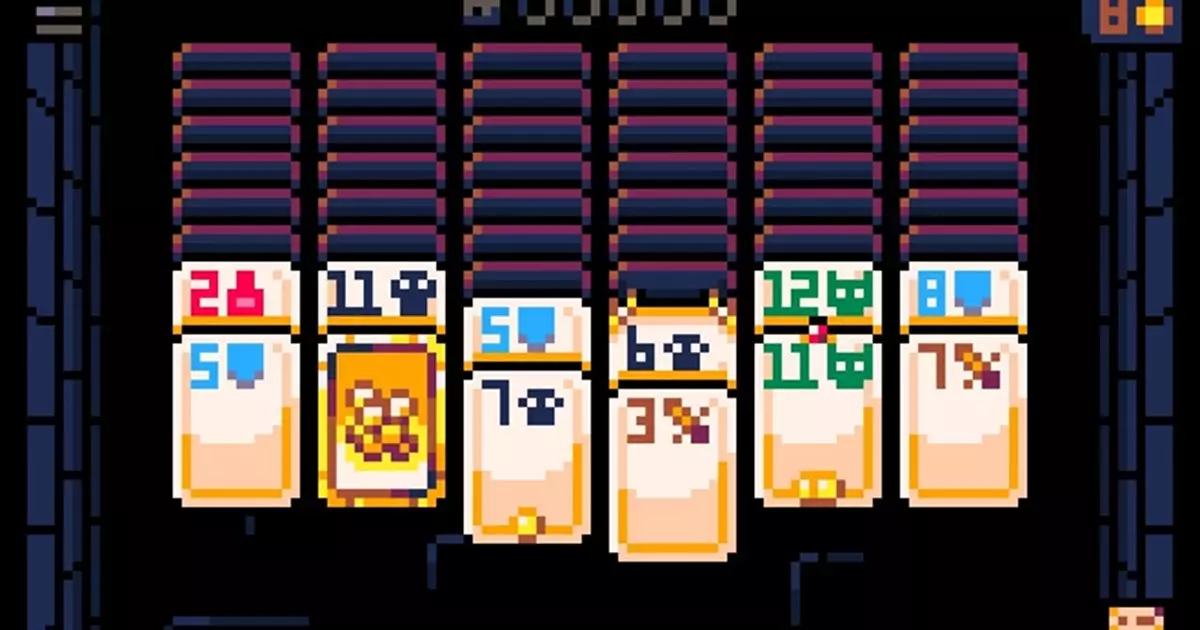In the vast landscape of indie games, certain titles manage to stand out not just for their artistry or storytelling, but for their inventive mechanics that challenge traditional gameplay paradigms. One such game is **Solitomb**, crafted by the ingenious designer Jakub Wasilewski. Originating as a PICO-8 prototype—an intuitive and playful programming tool—Solitomb is a solitaire-inspired dungeon crawler that fuses card-based strategy with the intricacies of monster battling. Unlike many grand strategy games that drown players in endless micromanagement, Solitomb offers a refreshing, streamlined experience that can be navigated within the confines of a single hour, making it remarkably accessible.
At the heart of Solitomb’s gameplay lies its unique card mechanics. Unlike traditional solitaire, where the objective revolves around order and arrangement, Solitomb transforms each card into a viable weapon or resource for battling demons. Players encounter a series of visible and concealed stacks, each representing potential attacks, shields, or potion boosts. The game operates on a foundation of mathematical strategy: players must arrange stacks of cards wisely, leveraging the numeric values on each card to maximize their combat efficacy.
For instance, when faced with a formidable enemy boasting five strength, a player needs to strategize by pairing that monster with an equivalent sword, then layering a shield and a potion to mitigate damage. The beauty of Solitomb lies in this strategic planning—players are compelled to match the strength of their foes with appropriate resources to ensure success without depleting their health.
Dynamics of Time and Efficiency
As players progress, the pressure rises. Solitomb introduces a unique mechanic that punishes procrastination. Each moment spent dragging and organizing cards before initiating combat invites potential damage from an impatient demon lurking in the dungeon. This layer of urgency compels players to act swiftly and efficiently, transforming the gameplay into a high-stakes race against time.
Moreover, combat efficiency is rewarded through combo multipliers when similar or sequential cards are played together. This incentivizes players to think critically not merely about individual card strengths but also about the relationships between those cards, adding a layer of strategy that enhances player engagement.
Character Classes and Upgrade Systems
Adding to the complexity of Solitomb are the character classes that players choose at the start of their run. Each class comes equipped with its own passive abilities and special powers, which can significantly alter gameplay dynamics. This feature enriches the game’s replayability, allowing players to experiment with various strategies and combinations in subsequent playthroughs. The incentive to optimize character selection, not to mention the between-level shop for procuring new cards and upgrades, creates a richer and more immersive experience that has the potential to keep players returning.
While Solitomb is still in its PICO-8 prototype phase, it displays all the hallmarks of a promising full-fledged game. The strategic depth found in its combat mechanics, paired with the looming threat of the dungeon’s demon, offers a tantalizing glimpse of what could become a groundbreaking entry in the card game genre. The game is not just about managing your hand; it’s about making crucial decisions under pressure, a testament to Wasilewski’s design prowess.
For those keen on innovative gaming experiences that combine familiar mechanics with fresh concepts, Solitomb is an exciting title to explore. Its ability to translate the essence of solitaire into a multi-faceted dungeon crawler demonstrates not only Wasilewski’s creativity but also the potential of indie games to redefine genres. As it stands, Solitomb is now available to play for free in browsers, appealing to both casual gamers and strategic thinkers alike. Whether you opt for this engaging prototype or revisit Wasilewski’s prior work, **Slipways**, you’ll find that each title offers a distinct yet fulfilling approach to strategy gaming in our increasingly complex gaming ecosystem.

